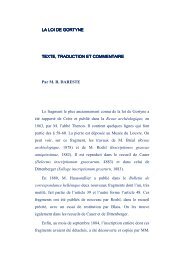CYPRIOT GRAMMAR
CYPRIOT GRAMMAR
CYPRIOT GRAMMAR
You also want an ePaper? Increase the reach of your titles
YUMPU automatically turns print PDFs into web optimized ePapers that Google loves.
Chapter 15: Basic Dialogue (2)<br />
More basic dialogue to help you enrich your vocabulary and encourage you to speak Cypriot.<br />
- ‘Ωρα καλη Μιχάλη!<br />
- ‘Ωρα καλη Στέφανε!<br />
- Ήντα κάμνετε; Που χωρκογυρίζεις;<br />
- Καλά καμνομεν. ‘Ετο είπαμεν να θκιανευτούμεν λίον. Να σου γνωρίσω την μιτσ’άν μου. Τούτος εν ο Στέφανος. Που ποδά η Μαρία.<br />
- Χαίρω πολύ Μαρία! Ιντα κάμνεις;<br />
- Επίσης! Καλά ευκαριστώ. Εσου;<br />
- Καλα τζ’αι εγιώνι. Ήντα κάμνεις τώρα; Σπουδάζεις οξά δουλέφκεις;<br />
- Είμαι φοιτήτρια. Σπουδάζω νομιτζ’ήν. Εσου;<br />
- Πολλά ωραία. Εγιώνι είμαι καθηγητής.<br />
- Φίλε μου Μιχάλη πρέπει να πιένομεν. Μηλούμεν. Πκιάσμε κανεναν τελέφωνον καμιάν ημέραν.<br />
- Καλό Στέφανε μου! Στο καλόν τζ’αι καλά να περάσετε!<br />
Steven: Hello Michael!<br />
Michael: Hello Steven!<br />
Steven: How are you (pl.)? Where are you going/where to are you heading?<br />
Michael: We’re fine. Well. We’re just taking a walk/We’re just walking around. Let me introduce to you my girlfriend. This is Steven. This is<br />
Mary.<br />
Steven: Nice to meet you Mary. How are you?<br />
Mary: Likewise. I’m fine thanks. How about you?<br />
Michael: I’m fine too. What are you doing now? Are you studying or working?<br />
Mary: I’m a student. I study law. How about you?<br />
Michael. How nice! I’m a professor.<br />
Steven: Michael mate, we have to go. Keep in touch. Give me a call some day.<br />
Michael. Of course Steven! Take care and have fun!<br />
Vocabulary<br />
Μιχάλης = Michael<br />
Στέφανος = Steven<br />
Που χωρκογυρίζεις; = Where are you going/where to are you heading?<br />
Καλά καμνομεν. = We’re fine.<br />
‘Ετο είπαμεν να θκιανευτούμεν λίον. = Well we’re just taking a walk/We’re just walking around.<br />
Να σου γνωρίσω την μιτσ’άν μου.= Let me introduce to you my girlfriend.<br />
Τούτος εν ο Στέφανος. = This is Steven.<br />
Που ποδά η Μαρία. = This is Mary.<br />
Χαίρω πολύ Μαρία! = Nice to meet you Mary.<br />
Ήντα κάμνεις τωρά; = What are you doing now?<br />
Σπουδάζεις οξά δουλέφκεις;= Are you studying or working?<br />
Είμαι φοιτήτρια. = I’m a student.<br />
Σπουδάζω νομιτζ’ήν. = I study law.<br />
Πολλά ωραία. = How nice!<br />
Εγιώνι είμαι καθηγητής. = I’m a professor.<br />
Φίλε μου Μιχάλη πρέπει να πιένομεν. = Michael mate, we have to go.<br />
Μηλούμεν. = Keep in touch.<br />
Πκιάσμε κανέναν τελέφωνον καμιάν ημέραν. = Give me a call some day.<br />
Καλό Στέφανε μου! = Of course Steven!<br />
Στο καλόν τζ’αι καλά να περάσετε! = Take care and have fun!<br />
Grammar Points<br />
1. In Cypriot we do not use an indefinite article in combination with the verb ‘to be’ as in English. Therefore when in English one would say<br />
I am a student in Cypriot we say I’m student.<br />
2. As you can see personal pronouns are usually omitted and only the form of a verb in the appropriate person is used.<br />
3. Cypriot uses the vocative quite often. When referring to someone directly using their name or indirectly using a noun such as ‘friend’<br />
both words take the vocative endings.<br />
4. ‘Ετο in this case can only be translated as ‘well’. It does not mean ‘here/there it is!’<br />
The point of these two dialogues was to help you practise a few grammar points we have already covered in the previous ten chapters but<br />
also to give you an introduction in the verb system for Cypriot. You have been introduced to various verbs in both singular and plural but<br />
also to auxiliary verbs. In the following chapters we will be covering the most difficult topic of Cypriot which is Verbs, Tenses and<br />
Conjugations.<br />
49





